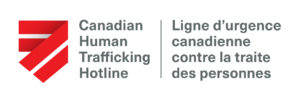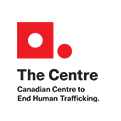This is everyone’s problem. Human trafficking is happening in communities across Canada. It’s a crime that doesn’t discriminate based on income or location. It’s happening to our children. It’s happening to our neighbours. It’s happening more than we know, right in front of our eyes. And we need to stop it. Now.
Change is also happening. Today, The Canadian Centre to End Human Trafficking (The Centre), a national charitable organization dedicated to ending human trafficking, launched the Canadian Human Trafficking Hotline at 1-833-900-1010. This multi-lingual hotline is the first-of-its-kind in Canada and is operational 24/7, 365 days a year. The hotline is committed to eradicating this horrific crime and assisting the estimated thousands of victims and survivors in Canada, who are being exploited through forced prostitution or forced labour.
Changing the Landscape… One Call at a Time
“This hotline will provide critical resources to victims and survivors and will help law enforcement dismantle human trafficking networks across the country,” says Barbara Gosse, CEO, The Canadian Centre to End Human Trafficking. “People find it hard to believe, but human trafficking is a real threat to vulnerable individuals across this country. Law enforcement officials and survivors tell us that the statistics grossly underestimate the number of individuals, many of them children, trapped by this human rights abuse. We all have a moral and an ethical obligation to make a positive difference, and the hotline is a vital step in this process.”
The hotline has adopted a three-prong approach to making a difference on this issue:
- Respond: leverage the hotline to immediately support and help victims/survivors; ensure a 24/7 response; and gather primary data that is critical to understanding the crime
- Equip: use data to define all the types of trafficking in a given area; learn how the criminal networks operate; identify opportunities for intervention; and provide accurate information to educate and make the public aware
- Disrupt: mobilize disruption campaigns to target specific types of trafficking
When to Call the Hotline
People should contact the hotline if they are victims/survivors of forced prostitution or forced labour, think they might be or think someone else might be. The Hotline Response Advocates will also take tips, answer questions and forward information, when appropriate, to law enforcement.
The website for the hotline – www.canadianhumantraffickinghotline.ca – will also be a public source for:
- Submitting a tip
- A national directory of social services
- Education and outreach materials
- Statistics and research reports
“A victim’s journey doesn’t end at the point of exit,” said Heidi Illingworth, Federal Ombudsman for Victims of Crime. “Having a national hotline available to connect victims and survivors with resources, both immediate and long-term, no matter where they are in Canada, is vital to supporting those who need it the most.”
It Takes a Global Village
Built on anonymity, this hotline is staffed by Hotline Response Advocates who have received more than 60 hours of victim-centered training provided by The Centre’s technical consultant, Polaris, a leader in the global fight to eradicate modern slavery. Polaris has operated the National Human Trafficking Hotline in the United States for more than 10 years and has also been instrumental developing similar systems in the UK and Mexico. Due to the international nature of this crime, global cooperation is a key to making a difference.
To date in Canada, the hotline has partnered with more than 400 service providers in communities across the country and is committed to continuing this work to build a robust referral directory with additional partners. The hotline houses the expertise to respond to all forms of human trafficking and victim populations across Canada, with services available in more than 200 languages.
Answering the Call: Public, Private and Corporate Support
The hotline has public, private and corporate support. Funding has been provided by Public Safety Canada and family foundations, along with generous donations from Canadians. The Centre has also been humbled to receive countless pro-bono hours from five of Canada’s largest legal teams: Dentons, Fasken, Torys, Goodmans and Thomson Reuters. This endeavour marks the first time these legal experts have ever worked together on a social responsibility project. Going forward, the hotline will strive to maintain and build support from these, and other, sources to further fuel its vital services for Canadians.
“Most victims of human trafficking are women and girls, including Indigenous women and girls, and marginalized groups in Canada. This terrible crime exploits human vulnerability created by poverty, racism, sexism, homophobia, transphobia, conflict and lack of social support networks,” says Public Safety Minister Ralph Goodale. “The launch of the Canadian Human Trafficking Hotline is an essential part of fighting this abhorrent attack on basic human rights and dignity. We are tremendously grateful for the leadership of the Canadian Centre to End Human Trafficking and countless partners who helped make this vital tool a reality.”
During the news conference to launch the hotline, The Centre also unveiled a new logo for the organization. Reflecting its Canadian roots, the logo is a red square with white circle in the centre to symbolize a collective hub. A red circle next to the square represents the mission to stop human trafficking. The new design works in concert with the logo of the Canadian Human Trafficking Hotline which embodies a protective shield.
“Trafficking crosses regional and provincial boundaries,” says Maria Koniuck, Detective Sergeant, Winnipeg Police Services’ Counter Exploitation Unit. “Demand is increasing and traffickers are using technology to increase profits. Canadians need to be informed and aware that this crime is happening in small, remote communities as well as big cities. Data collected by the hotline will assist law enforcement in combating this crime and supporting survivors.”
For more information, please visit www.canadianhumantraffickinghotline.ca.
About Human Trafficking
Human trafficking involves the recruitment, transportation, harbouring and/or exercising control, direction or influence over the movements of a person to exploit that person, typically through sexual exploitation or forced labour. The victims, who are mostly women and children, are deprived of their normal lives and coerced to provide their labour or sexual services all for the direct profit of their perpetrators. Exploitation often involves intimidation, force, sexual assault and threats of further physical violence to themselves and even their families. Human trafficking is identified as an indictable offence in Canada in sections 279.01 and 279.011 of the Criminal Code and section 118 of Canada’s Refugee and Immigration Protection Act.
About The Canadian Centre to End Human Trafficking
The Canadian Centre to End Human Trafficking is a charity dedicated to ending all types of human trafficking in Canada. Human trafficking in Canada is occurring at shocking levels. It is a sophisticated, organized crime and that demands sophisticated, coordinated and integrated solutions. The Canadian Centre to End Human Trafficking has been established as the national “backbone” organization working on this issue. The Centre collaborates and works with the various stakeholders dedicated to this issue, including all levels of government, private sector businesses and front-line service providers in order to advance best practices and eliminate duplicate efforts across Canada. The Canadian Centre to End Human Trafficking exists to create a national strategy for change. For more information, visit www.canadiancentretoendhumantrafficking.ca.
-30-
For more information, or to speak with a representative of The Canadian Centre to End Human Trafficking, please contact: Victoria Mattacchione, Strategic Objectives
Tel: (416) 366-7735 X260. Email: victoria.mattacchione@strategicobjectives.com

